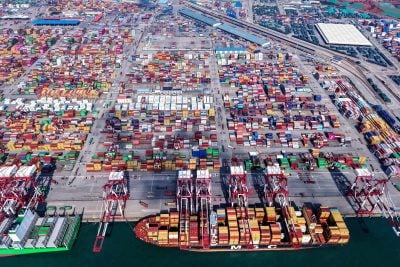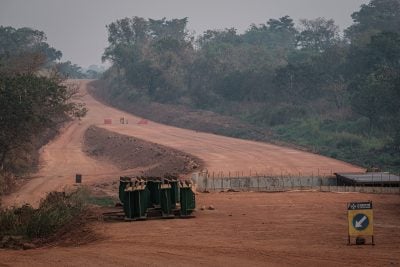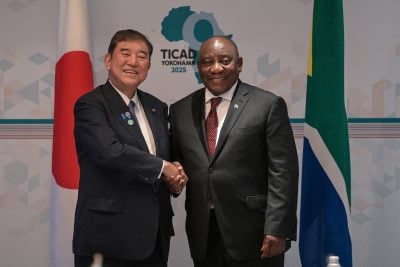Job Mangwalala, 55, sells curios at the tourist attraction center in Victoria Falls, Zimbabwe.
Mangwalala has run the business since 1996. He sells a variety of wooden carvings of animals, which are popular with tourists especially from Europe.
The business is his livelihood; it feeds and educates his four children.
But business has been tough.
“I sell less and for a long time compared to the years before Covid,” he said “Tourists who buy our goods have reduced.”
This has forced Mangwalala to look for markets outside Zimbabwe. Every six months, Mangwalala crosses the border into the South African city of Johannesburg where he supplies his products in bulk.
The incentive of doing cross border trade is clear. He sells more in a short time across the border than in Zimbabwe.
Lion Park curio shop and the Chameleon market are two destinations for his goods in Johannesburg.
It takes him one and half days to travel from Victoria falls to Johannesburg. Mangwalala cannot extend his stay in South Africa past one month.
“I can’t stay for more than a month because I do not have a business permit that can allow me stay for three months in South Africa,” he said. “The process of getting a business permit is too long and complicated.”
At the Zimbabwe–South Africa border crossing point Mangwalala declares his goods for clearance, fills in the declaration form and pays duty of 60 Rands per kilogram of the goods.
He spends $300 (6,000 rands) in total on transport and border clearance.
“A long time ago it was difficult to get the business visa and get cleared at the border but now it’s getting easier,” he said.
Mangwalala is thinking of venturing into other African markets such as Botswana and Namibia.
Venturing into other African markets has made Mangwalala and other like-minded traders attempt to come together to help and advice each other.
But those plans have not taken hold.
“There were plans to have a cross border association and we were a group of 100 traders who had registered to join but nothing has been communicated since,” he said.
“They mentioned AfCFTA to help us with trading in other countries which was a good thing but we haven’t heard from them again,” he said.
Can the AfCFTA do more for traders?
African Continental Free Trade Adrea (AfCFTA) is the world’s largest free trade area bringing together the 55 countries of the African Union (AU) and eight Regional Economic Communities (RECs).
The overall mandate of the AfCFTA is to create a single continental market with a population of about 1.3 billion people and a combined GDP of approximately $3.4 trillion.
As part of its mandate, the AfCFTA is to eliminate trade barriers and boost intra-Africa trade.
The AfCFTA is likely to reduce tariffs, boost economic growth and increase collaboration amongst African countries which will help the continent meet both the objectives of the UN Sustainable Development Goals in 2030 and the African Union’s Agenda 2063 for the economic, social and political regeneration of the continent.
Enactment of the AfCFTA would not only be a big boost to the likes of Mangwalala but also to more women who have joined the cross-border trade.
Rudo Kabete, 40 years, sells African outfits and fabric at her shop in Victoria Falls, Zimbabwe.
She is a tailor by profession and started her business because of lack of employment opportunities. Together with five other women, they travel together and sell their goods beyond the Zimbabwean border into Namibia and South Africa.
“Selling outside the country is better because we sell in bulk and make good profit,” she said “Here in Victoria Falls we make very little profit and it is hand to mouth.”
It takes two and half days to travel to Cape Town. She stays in South Africa for three weeks selling her goods. Kabete heads back home – Zimbabwe – for another three months before traveling out again.
“Declaration of the goods at the border is a lengthy process because you require approval from the agriculture and forestry commissions,” she notes as one of the challenges of doing cross border trade in Africa.
Kabete is a member of a local Lugwasyno women’s cooperative who support each other through advice and access to finance.
Kabete has not heard of the AfCFTA, but wants an organisation that can help women to declare their goods at the border as a group and not as an individual.
Kabete also works with Kenyan women traders who sell their jewellery in Victoria Falls.
They sometimes supply her with jewellery which she then sells in Namibia and Cape Town.
“It will be good if the borders are open so that I can also travel by myself to Kenya to buy the jewellery in bulk,” she said.
What Kabete and other traders in Zimbabwe are looking for is information and help to make their cross border trade easier.
Standards need to improve, says Zimbabwean government
Velile Dube, client advisor, Zimtrade, says that the Zimbabwe government, via the Ministry of Trade, gives information to traders on the export market so that they can make informed decisions.
“The problem with the most traders like the curio traders, they do not adhere to the set standards where they are meant to export up to $2000 worth of goods,” Dube said. “They instead smuggle their goods into the neighbouring countries.”
Getting a business permit is not a challenge as long as they follow the process, he said.
The government has a flagship programme for the marketing and branding of products for export, he adds. The challenge for most products in Zimbabwe is packaging of a low standard, he said.
“We train traders, organise for trade fairs, negotiate deals for them and conduct advocacy so that the traders are aware of any new laws and agreements like AfCFTA and how they can benefit from it,” Dube said.
Stephen Karing, integration director at ECA, says under the AfCFTA, there will be opportunities for women traders to access a much bigger market and larger trading networks.
The AfCFTA provides the first opportunity for continent-wide free trade, an important step as Africa moves towards the African Economic Community (which includes the stated aim of the creation of free trade areas, customs unions, a single market, a central bank and a common currency) in 2034, he says.
“African countries do not trade with each other for other multiple reasons such as colonial ties, but with the introduction of AfCFTA, trading within Africa will be cheaper,” Karing insists.
For the traders plying the familiar route between Zimbabwe and South Africa, those improvements cannot come soon enough.
Want to continue reading? Subscribe today.
You've read all your free articles for this month! Subscribe now to enjoy full access to our content.
Digital Monthly
£8.00 / month
Receive full unlimited access to our articles, opinions, podcasts and more.
Digital Yearly
£70.00 / year
Our best value offer - save £26 and gain access to all of our digital content for an entire year!


 Sign in with Google
Sign in with Google 





